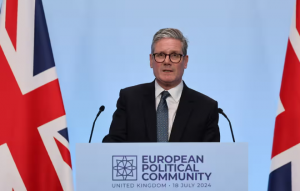Afortnight after the election, I cannot remember a time in my life when a sense of hope was so inextricably entwined with a sense of trepidation, even doom. We live in 2024; we are grateful for the downfall of a Tory administration so little imbued with imaginative empathy about the daily lives of the people it governed; but our thoughts are already tuned, fearfully and obsessively, to 2029 and beyond. Almost everywhere abroad we see the rise of the populist, authoritarian right. Is it really plausible to think Britain can stay immune?
Perhaps – just perhaps – we can. There is a decent argument that with the Brexit vote in 2016 we have already had our populist, boil-lancing moment – a moment that was ultimately, in my view, a cry of impotent despair (especially from older people) against modernity and the bewildering forces of change. Maybe that was enough; and it is notable how, on the issue itself, a long static period post-2016 of entrenched views on both sides has in the last year or so given way to a significant majority seeing that vote as a mistake.
I also take comfort in that most methodologically fraught of concepts, our national character. A strong attachment to the local, the practical, the empirical; a deeply engrained suspicion of the abstract, of ideas, of intellectuals; above all, an instinctive preference for the moderate over the extreme. These are stereotypes, I know, but that does not mean they are false. And from my experience of researching and writing about postwar Britain, they are stereotypes that I largely recognise. So much, especially in our increasingly quasi-presidential system, hinges on Keir Starmer, and again I take a degree of comfort. I remember how, when he became Labour’s leader in 2020, I was struck forcibly by how he seemed his party’s most Attlee-like leader since Clement Attlee himself. Understated, no great charisma or oratorical fluency, a deep commitment to public service – the reassuring similarities were obvious enough. And it was those qualities, combined with a doggedly determined execution of policies – sometimes bold, sometimes incremental – designed to improve life as a whole for working people and their families, that made Attlee our greatest peacetime prime minister of the 20th century. He was also, crucially, an English patriot: not flag-waving, not a xenophobe, but deep in his bones. The public knew it; and it is hardly conceivable that in 1945 they would have given him a landslide victory over the war hero Winston Churchill if they had not.
So, too, were Harold Wilson and Jim Callaghan. The winner of four elections out of five, and a Yorkshireman with his values firmly rooted in northern nonconformity, Wilson was utterly different from his Old Etonian predecessors at No 10 and had an intuitive grasp of the centre of political gravity, of middle England’s concerns; as PM, he went to extraordinary lengths to keep Britain out of America’s ill-fated Vietnam war; and it was no coincidence that he was one of the Queen’s favourite first ministers. As for the even more robustly patriotic Callaghan, with his close links to the Royal Navy, it is true that in 1979 he lost his only election; but he was more personally popular than Margaret Thatcher at the time and had, as he recognised, deeper forces against him.
In contrast with those three, and whatever their individual merits, middle England was probably never going to love a palpable intellectual (Hugh Gaitskell, Michael Foot); nor the son of a Marxist intellectual (Ed Miliband); nor a Welshman (Neil Kinnock) or a Scot (John Smith, Gordon Brown); least of all a bearded, peace-loving internationalist (Jeremy Corbyn). What about Tony Blair? Yes, a gifted politician who won a hat-trick of elections; but perhaps because of a certain rootlessness, a certain shape-shifting quality, never quite trusted, never quite fully accepted. And though it was not until 12 years after he left office that Labour’s “red wall” so spectacularly collapsed, its erosion – its sense of being neglected and left behind – was already well under way.
Who would comfortably bet against that recovered red wall going Faragist next time round? It is smell the coffee time for progressives
Who, though, would now confidently bet against that recovered red wall going Faragist next time round? It is surely smell-the-coffee time for progressives. We as a country have made such extraordinary strides in race relations since the 1960s (think Smethwick, think rivers of blood) that it would be foolish to jeopardise them because of inadequate control over immigration. Likewise with social liberalism more broadly – who, even at the height of flower power, could have imagined the legalisation of gay marriage? – we can afford to bank our gains and not endanger them, with the Roe v Wade analogy all too obvious. And a quiet, modest patriotism, especially a patriotism rooted in a sense of place, as the necessary antidote to abhorrent and dangerous nationalism: for myself, I have no problem with that, and it gave me particular pleasure that Starmer during the election stopped off at some half-dozen smaller football grounds, very deliberately not the big-city grounds, including that of my own team, Aldershot Town. Five days later, the home of the British army went Labour for the first time ever.
All politicians, however much guided by instinct and common sense, need some kind of lodestar. Mine for Starmer would be Michael Young, principal author of Labour’s 1945 manifesto. In later years, he offended fellow sociologists by revealing the royal family’s popularity with the working class; emphasised the beneficial importance of the family, including the extended family; stood up for the consumer against the producer; and, his greatest legacy, warned against privileging highly educated, self-perpetuating “meritocratic” elites over the mass of working people, whose lives are just as valuable. My impression is that Starmer and those around him get that. The trick now is not to forget it.
The Guardian

